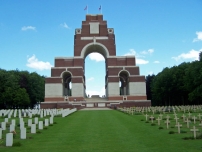| First Name: | Walter | Last Name: | CAPPLEMAN | |
|---|---|---|---|---|
| Date of Death: | 15/09/1916 | Lived/Born In: | Edmonton | |
| Rank: | Rifleman | Unit: | Rifle Brigade8 | |
| Memorial Site: | 1. County Hall Memorial 2. Thiepval Memorial, France | |||
Current Information:70, Sutherland Road, Lower Edmonton
The Battle of the Somme (July-November, 1916) By the beginning of September, 1916, the Battle of the Somme had been raging for two months. Thousands of men had already been killed or wounded or were simply missing, never to be seen again and and just a few square miles of the French countryside, all in the southern part of the battlefield, had been captured from the enemy. Mistakes had been made by the various commanders and would be continued to be made but there was no turning back as the British, Australians, South Africans, New Zealanders and Canadians carried on battering away at the German defences in the hope of a breakthrough, So it continued all the way through to November with nearly every battalion and division then in France being drawn into it at some stage. In the end the German trenches had been pushed back a few more miles along most of the line but the cost in lives had been staggering. By the end of the fighting in November, 1916, British Army casualties numbered over 400,000, killed, wounded and missing. The Battle of Flers-Courcelette (15-22 September, 1916) On 15th September, 1916, the offensive on the Somme was renewed with a full scale attack on the German third line of defences. Four Army Corps were used on a front that stretched from Combles, through the village of Flers and on to Courcelette. The artillery barrage that preceded this attack was more concentrated than that on 1st July and the attack itself was more successful. The villages of Flers, Martinpuich and Courcelette were captured and the enemy was finally pushed out of High Wood, but the breakthrough was not achieved and the reality was that when the battle ended on 22nd September, the front line had just been moved forward a mile or so. The battle is notable for being the first time that tanks were used. On 15th September, 14th Division attacked towards the village of Flers from a line to the east and north of Longueval and Delville Wood. Th advance of 41 Brigade was led by the 8th Rifle Brigade and 8th King’s Royal Rifle Corps battalions with 7th Rifle Brigade and 7th King’s Royal Rifle Corps following close on their heels. The two leading battalions suffered heavy casualties from machine-guns in Pint Trench. but were not stopped by this and reached Tea Support Trench and Pint Trench. Their attack was assisted by three tanks. One was ditched in Delville Wood and another arrived too late to be of much assistance. The third, D3, was knocked out at Tea Support trench but despite this 8th Rifle Brigade and 8th King’s Royal Rifle Corps moved on and by 7am had captured the first objective, the Switch Line where they were joined by 7th Rifle Brigade and 7th King’s Royal Rifle Corps, both of whom had been held up by isolated pockets of resistance as they made their way forward. By now the Switch Line was becoming very congested but this problem was eased when at 8am, 7th Rifle Brigade and 7th King’s Royal Rifle Corps moved forward to Gap Trench, the second objective. There was of course much more to these events than this simplified narrative as was always the case in the confusion and heat of battle. At one stage some of the enemy who had surrendered, made their way to a bomb store and began to bomb from the rear. There was a knock-on effect from 6th Division being held up in front of the formidable Ginchy Quadrilateral which slowed down the advance of the Guards on the right of 14th Division resulting in machine-gun and rifle fire from the flanks. There was also a great deal of intermingling among the attacking units and then in the evening it began to rain making it a very uncomfortable night for the soldiers as they consolidated their positions. Not surprisingly, the fierce fighting had resulted in many casualties, one of whom was Walter Cappleman of 8th Rifle Brigade. |
||||
| « Back to Search Results | ||||
| If you think any of the information shown here is incorrect, Click Here to submit your amends and comments | ||||




